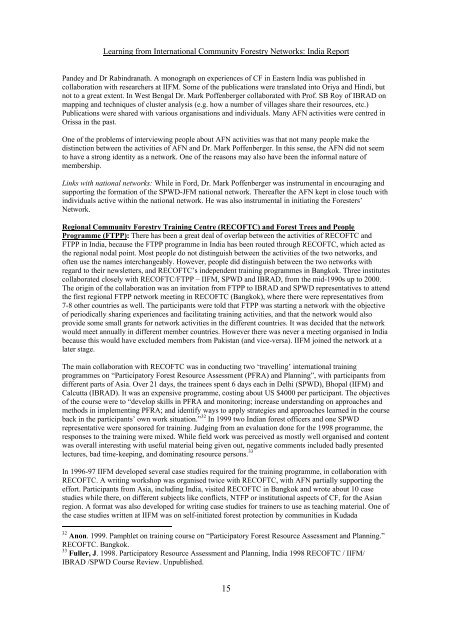Snapshots of International Community Forestry Networks: Country ...
Snapshots of International Community Forestry Networks: Country ...
Snapshots of International Community Forestry Networks: Country ...
You also want an ePaper? Increase the reach of your titles
YUMPU automatically turns print PDFs into web optimized ePapers that Google loves.
Learning from <strong>International</strong> <strong>Community</strong> <strong>Forestry</strong> <strong>Networks</strong>: India Report<br />
Pandey and Dr Rabindranath. A monograph on experiences <strong>of</strong> CF in Eastern India was published in<br />
collaboration with researchers at IIFM. Some <strong>of</strong> the publications were translated into Oriya and Hindi, but<br />
not to a great extent. In West Bengal Dr. Mark P<strong>of</strong>fenberger collaborated with Pr<strong>of</strong>. SB Roy <strong>of</strong> IBRAD on<br />
mapping and techniques <strong>of</strong> cluster analysis (e.g. how a number <strong>of</strong> villages share their resources, etc.)<br />
Publications were shared with various organisations and individuals. Many AFN activities were centred in<br />
Orissa in the past.<br />
One <strong>of</strong> the problems <strong>of</strong> interviewing people about AFN activities was that not many people make the<br />
distinction between the activities <strong>of</strong> AFN and Dr. Mark P<strong>of</strong>fenberger. In this sense, the AFN did not seem<br />
to have a strong identity as a network. One <strong>of</strong> the reasons may also have been the informal nature <strong>of</strong><br />
membership.<br />
Links with national networks: While in Ford, Dr. Mark P<strong>of</strong>fenberger was instrumental in encouraging and<br />
supporting the formation <strong>of</strong> the SPWD-JFM national network. Thereafter the AFN kept in close touch with<br />
individuals active within the national network. He was also instrumental in initiating the Foresters’<br />
Network.<br />
Regional <strong>Community</strong> <strong>Forestry</strong> Training Centre (RECOFTC) and Forest Trees and People<br />
Programme (FTPP): There has been a great deal <strong>of</strong> overlap between the activities <strong>of</strong> RECOFTC and<br />
FTPP in India, because the FTPP programme in India has been routed through RECOFTC, which acted as<br />
the regional nodal point. Most people do not distinguish between the activities <strong>of</strong> the two networks, and<br />
<strong>of</strong>ten use the names interchangeably. However, people did distinguish between the two networks with<br />
regard to their newsletters, and RECOFTC’s independent training programmes in Bangkok. Three institutes<br />
collaborated closely with RECOFTC/FTPP – IIFM, SPWD and IBRAD, from the mid-1990s up to 2000.<br />
The origin <strong>of</strong> the collaboration was an invitation from FTPP to IBRAD and SPWD representatives to attend<br />
the first regional FTPP network meeting in RECOFTC (Bangkok), where there were representatives from<br />
7-8 other countries as well. The participants were told that FTPP was starting a network with the objective<br />
<strong>of</strong> periodically sharing experiences and facilitating training activities, and that the network would also<br />
provide some small grants for network activities in the different countries. It was decided that the network<br />
would meet annually in different member countries. However there was never a meeting organised in India<br />
because this would have excluded members from Pakistan (and vice-versa). IIFM joined the network at a<br />
later stage.<br />
The main collaboration with RECOFTC was in conducting two ‘travelling’ international training<br />
programmes on “Participatory Forest Resource Assessment (PFRA) and Planning”, with participants from<br />
different parts <strong>of</strong> Asia. Over 21 days, the trainees spent 6 days each in Delhi (SPWD), Bhopal (IIFM) and<br />
Calcutta (IBRAD). It was an expensive programme, costing about US $4000 per participant. The objectives<br />
<strong>of</strong> the course were to “develop skills in PFRA and monitoring; increase understanding on approaches and<br />
methods in implementing PFRA; and identify ways to apply strategies and approaches learned in the course<br />
back in the participants’ own work situation.” 32 In 1999 two Indian forest <strong>of</strong>ficers and one SPWD<br />
representative were sponsored for training. Judging from an evaluation done for the 1998 programme, the<br />
responses to the training were mixed. While field work was perceived as mostly well organised and content<br />
was overall interesting with useful material being given out, negative comments included badly presented<br />
lectures, bad time-keeping, and dominating resource persons. 33<br />
In 1996-97 IIFM developed several case studies required for the training programme, in collaboration with<br />
RECOFTC. A writing workshop was organised twice with RECOFTC, with AFN partially supporting the<br />
effort. Participants from Asia, including India, visited RECOFTC in Bangkok and wrote about 10 case<br />
studies while there, on different subjects like conflicts, NTFP or institutional aspects <strong>of</strong> CF, for the Asian<br />
region. A format was also developed for writing case studies for trainers to use as teaching material. One <strong>of</strong><br />
the case studies written at IIFM was on self-initiated forest protection by communities in Kudada<br />
32<br />
Anon. 1999. Pamphlet on training course on “Participatory Forest Resource Assessment and Planning.”<br />
RECOFTC. Bangkok.<br />
33<br />
Fuller, J. 1998. Participatory Resource Assessment and Planning, India 1998 RECOFTC / IIFM/<br />
IBRAD /SPWD Course Review. Unpublished.<br />
15

















![CynefinFramework final [Read-Only]](https://img.yumpu.com/19017304/1/190x135/cynefinframework-final-read-only.jpg?quality=85)